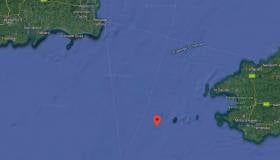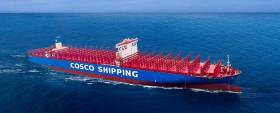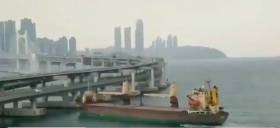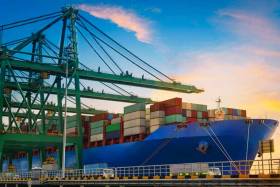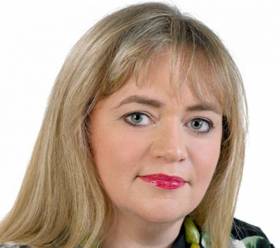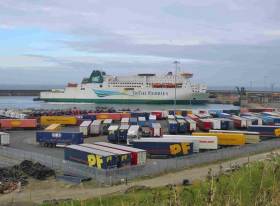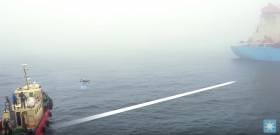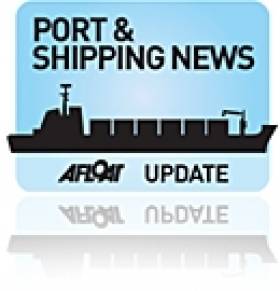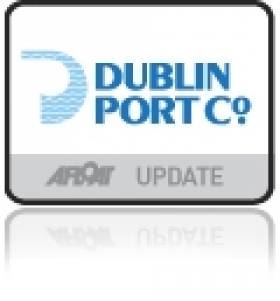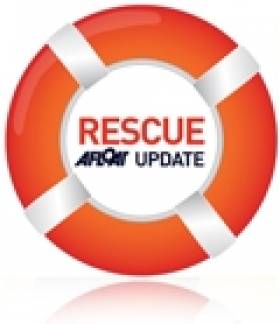Displaying items by tag: Shipping
Cargo Ship Loses Containers Enroute to Dublin
A cargo ship en route to Dublin Port was caught in this week's storms and lost at least 12 containers overboard.
The Maritime Bulletin reports that the ship 'Elbcarrier' lost the containers in the Celtic Sea on the afternoon of Sunday, December 8, while en route from Rotterdam to Dublin and being caught in rough seas.
The Bulletin's reporter is Erofey Schkvarkin, a Merchant Marine Captain, who also writes that 12 drifting containers were spotted at 2330 UTC in vicinity 51 40N 005 50W.
The ship reached Dublin in the afternoon Dec 9. More on this in the Maritime Bulletin here
Containers Blown Over
Separately, a reader has sent Afloat photo of containers blown over in Dublin Port in high winds this week.
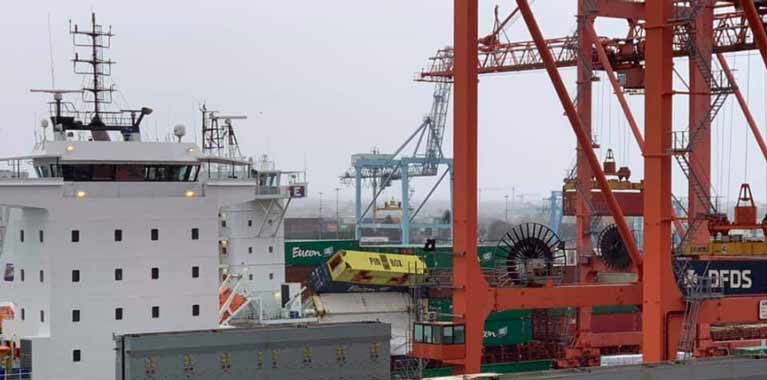 Shipping containers capsized in Dublin Port this week
Shipping containers capsized in Dublin Port this week
Lloyds Register Announces Collaboration to Develop Industry-First Ocean-Going Autonomous Navigation System
Lloyd’s Register (LR) announced today – during Singapore Maritime Week – a Memorandum of Understanding (MoU) with ST Engineering Electronics Ltd. (STEE), a leading Information Communications Technologies (ICT) provider and co-creater of Smart City Solutions, and Mitsui & Co., Ltd (Mitsui), the second largest trading house in Japan.
The partners will collaborate on the ‘Development of Ocean-going Autonomous Navigation System on a Marine Asset’, the MoU forms the foundation of the MPA-funded ‘World’s Largest Ocean-Going Autonomous Vessel Programme’, which was also announced today.
“LR’s involvement in this project builds on the capability and experience already gained from our partnership in other industry-leading and world first autonomous projects,” said Andy McKeran, LR Commercial Director Marine & Offshore. “However, this project, a world first for the deployment of autonomous navigational technology to an ocean-going vessel for commercial operations, pushes the boundaries of autonomous technology and moves the industry towards deployment of autonomous navigation systems onboard vessels for enhanced performance and critically, safety.”
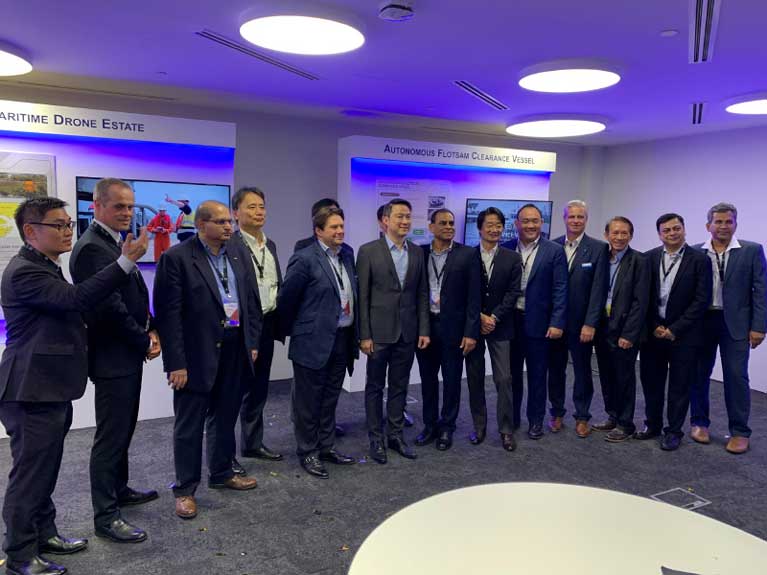 LR announces collaboration to develop industry first ocean-going autonomous navigation system
LR announces collaboration to develop industry first ocean-going autonomous navigation system
“Increasing interest in maritime autonomy and remote access/control technologies is a specific example of larger technological changes we are currently seeing in the maritime industry. Essential to the successful and safe adoption of these technologies is that robust use cases are established, for example to improve navigational safety, supply chain efficiency or operational costs of marine assets. Autonomous systems will also provide opportunities for skilled seafarers to focus on what they do best, and the safe and sustainable integration of autonomous systems relies on the appropriate engagement with seafaring professionals.”
He continued, “Working with STEE, who have already developed and proven this capability and are now looking to work to scale in the commercial marine market, is what sets this project apart; STEE provide world-class technical expertise, technology and advanced learnings on autonomous systems in the marine environment. We will support with expertise on assurance, certification and regulation for the application of autonomy in the maritime environment as well as approval of systems where appropriate.”
Russian Vessel Hits Bridge in Busan (Video)
The Russian vessel Seagrand hit a bridge in the South Korean city of Busan yesterday as depicted in this tweeted video below.
There were no casualties according to reports but there was 'severe' damage to the bridge.
Police detained Russian sailors onboard.
Russian vessel SEAGRAND hit a bridge in South Korean Busan, no casualties, but severe damage to bridge. Police detained Russian sailors, captain was drunk https://t.co/CPpj3sCRTz #Korea pic.twitter.com/N9sog4cfNQ
— Liveuamap (@Liveuamap) February 28, 2019
Sea Change: ‘Amazon & Alibaba Creating the Biggest Revolution in Shipping’
ParcelHero’s David Jinks will tell a major world maritime conference in London. Shipping lines will be forced to either integrate with Amazon and Alibaba or be submerged by the digital revolution.
‘A change in global supply chains even greater than the introduction of containers in the 1950s is underway, and shipping lines that don’t adapt to the new e-commerce revolution will go under in the same way as the many long-established companies that failed to adapt to containerization.’
That’s the message that David Jinks MILT, Head of Consumer Research at the international delivery experts ParcelHero, and former Editor of Logistics & Transport Focus and Lloyds Shipping Index, will tell delegates at this month's prestigious Digital Ship CIO Conference, at the Waldorf Hotel on Thursday 28th February.
Says David: ‘The prime need for Amazon to entirely integrate its supply chain means it has already revolutionized its land and air operations – it now delivers 80% of its own parcels in the UK and flies over 40 Boeing 767 Amazon Air jet freighters. It now has the crucial supply chain from China to the West firmly in its sights. At the same time the Chinese e-commerce giant Alibaba, whose volumes make Amazon look like a minnow, is fast integrating its own deliveries to the US and Europe.’
Warns David: ‘As freight forwarders and shipping agents become obsolete under the new digitized retail supply chains, shippers must either integrate with Fulfilment by Amazon and Alibaba’s One Touch booking programme, or be overwhelmed by the tsunami that is sweeping over the shipping industry.’
David will reveal that shipping lines must either adapt to survive - as Maersk is attempting by integrating with Alibaba and introducing its revolutionary Captain Peter App to track container loads - or face the prospect of Amazon launching its own rival fleet; it already has its own freight forwarding service.
Reveals David: ‘When the first container ship sailed in 1956 a longshore union boss said: ”‘I’d like to sink that son of a bitch”. He recognised the sea change that would follow. We can now see that this digital revolution will result in Internet of Things (IoT) connected machines placing orders automatically with Chinese manufacturers, and integrating with autonomous ships like the soon-to-be-launched Yara Birkeland. It’s sad but true that those shipping lines, freight forwarders and agents who still favour personal contact and the phone will be left all at sea as the pace of integration increases.’
Joining David at the conference will be speakers from IBM, Inmarsat, Hill Dickinson LLP and other leading maritime industry organisations.
For more information on the leading industry figures speaking at the Digital Ship CIO Conference and details of how to attend see here
Mairéad Ní Cheóinín Appointed to Seafarers UK Fundraising Role
Mairéad Ní Cheóinín has been appointed to Seafarers UK as the charity’s new Corporate Fundraising Manager where her focus will be on engaging with the commercial maritime sector.
Mairéad brings a wealth of business development, marketing experience and industry knowledge to the position from her previous roles, working with Steamship Mutual P&I, TradeWinds, Informa PLC in London and the Irish Maritime Development Office in Dublin.
Mairéad joins the grant-giving, campaigning and fundraising charity at an exciting time, as it celebrates its Centenary and is looking ahead to the next phase of its future. Her role will be to raise awareness of Seafarers UK’s wider impact within the maritime charity sector.
Seafarers UK aims to increase financial support for its charitable work through encouraging participation in corporate donations, employee fundraising, challenge events and payroll giving, as well as funding support for specific projects.
Last year Seafarers UK awarded £2.57 million in funding to 69 organisations and projects, helping more than 185,000 people in the process. For more information about Seafarers UK’s work or any of its fundraising or donation initiatives please visit www.seafarers.uk
Commenting on her appointment Mairéad Ní Cheóinín said ‘I am honoured to join Seafarers UK at this juncture. It is vitally important to maintain awareness within the maritime and fishing sectors of the contribution Seafarers UK has made and continues to protect and provide for the welfare of past, present and future seafarers. I am looking forward to promoting all the great work and initiatives Seafarers UK supports to our existing and new corporate partners and donors.’
Nigel Shattock, Seafarers UK’s Director of Fundraising & Communications, said ‘I am very pleased to be able to announce Mairéad’s appointment. The Seafarers UK team is looking forward to working with Mairéad in her role of reaching out to the wider maritime sector and asking firms and their staff to get to know our unique charity better, and to work with us in achieving our goals of helping seafarers in need, supporting maritime youth and in raising awareness of the opportunities that this fantastic sector has to offer.’
Five People Found In Shipping Container In Wexford
#Shipping - Five people were found in a shipping container in Wexford at the weekend, as BreakingNews.ie reports.
The three men, a woman and a young girl, all believed to be Kurdish, were discovered at a haulage yard in New Ross on Sunday evening (16 October) in a container thought to have come in on a ferry from Cherbourg to Rosslare Europort.
Gardaí said the five, who were in good health, are being detained under immigration law — and are claiming asylum due to persecution in their home region.
According to TheJournal.ie, New Ross is also where nine Kurdish refugees were found in the back of a truck after stowing away on a ferry from France to Rosslare this past February.
Drone Technology to Cut Delivery Costs to Ships
In the shipping and tanker business, it can be hard to predict far in advance which port will be called to next and even when in port, it can be complicated and expensive to deliver items to vessels as they are not alongside the quay. Drone technology offers a solution to this and Maersk Group have been trialling it at sea.
Drones could cut time and costs for deliveries and inspections – but shipping lines say they must be reliable and absolutely safe. Maersk Tankers is testing delivery to vessels on drones that have been certified for explosive environments.
Costs for a barge are on average USD 1,000 and can be higher. That means, drone use could with the current payload bring potential savings of USD 3,000-9,000 per vessel per year, Maersk Tankers estimates.
First Woman Elected To Lead Master Mariners
#MasterMariners - The Irish Institute of Master Mariners, the professional body for shipmasters, has elected a woman to lead the organisation for the first time.
Capt Sinead Reen was also the first woman to qualify as a deck officer, having studied at CIT Cork where Nautical Science courses were held before they were transferred to the new National Maritime College at Ringaskiddy, where she now lectures.
She was also the first Irish woman to gain a Certificate of Competency as a Master Mariner and has served at sea aboard supertankers, but she now resides in Crosshaven with her husband, fellow Master Mariner Cormac MacSweeney.
Capt Reen's election underlines the opportunities of a career at sea for women in what has been a male-dominated profession.
The Irish Institute of Master Mariners promotes safe, efficient and professional conduct in the public and commercial maritime sectors. It is a member of the International Federation of Shipmaster's Associations and the Confederation of European Shipmasters.
#DublinPort - Dublin Port's chief executive has moved to dispel criticism of the city's Docklands an entry point for tourists, coming after another bumper year for cruise traffic.
Speaking to Bobby Kerr on NewsTalk's Down to Business show yesterday (10 January), Eamon O'Reilly hailed the port's growth – 7% last year alone, with 5% growth expected in the coming year – and its welcoming of more than 140,000 passengers on board 86 cruise liners in 2014.
But he also brushed aside accusations that the industrial appearance of Dublin Port gives a poor impression to cruise visitors docking in the area.
"We built the business from nothing to 100 ships in 2013, 86 in 2014. If you're building any business, or any stream of business, you don't go out and spend huge amounts of money to build infrastructure," he said.
"You don't do that, you work with what you have, which is what we have done. So it's funny, we seem to get criticised for our own success."
Beyond the port, O'Reilly commented on the untapped potential of the Liffey quays for boat traffic and the industries that might support, though noted the dilemma that "as you try to do more with the Liffey, the bridges start to get in your way."
He also detailed plans for the future that include another bid to bring the Tall Ships back to the capital in 2019, as well as progress on the Alexandra Basin project to increase the port's capacity for bigger container and cruise ships, not to mention increased ferry traffic.
25 Rescued As Car Transporter Lists In Solent
#Rescue - BBC News reports that the crew of a car transporter ship that ran aground on a sandbank in the Solent last night (Saturday 3 January) have been brought to safety.
One of the 25-strong crew was hospitalised with non life-threatening injuries after the Hoegh Osaka hit the Bramble Bank, due north of Cowes, around 9.30pm.
RNLI lifeboats from nearby Calshot, Cowes, Yarmouth and Southampton were joined by the Solent coastguard helicopter and a number of tugboats in the emergency response.
The 180m vessel is currently listing at a 45 degree angle, but it is not taking on water and is expected to be refloated.
The Bramble Bank, or Brambles, where the ship ran aground, is well known for the annual cricket match that takes place there when uncovered by low spring tides.



























